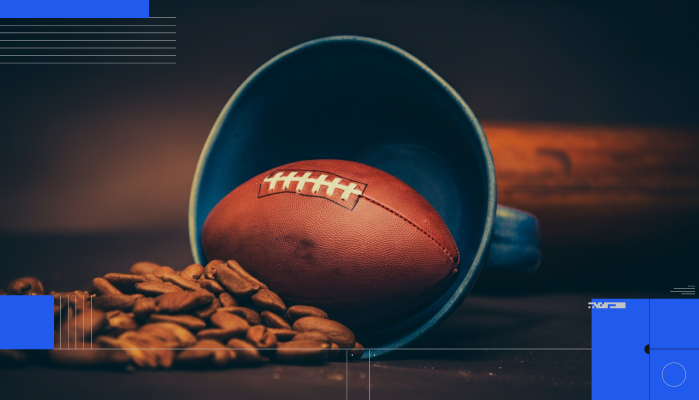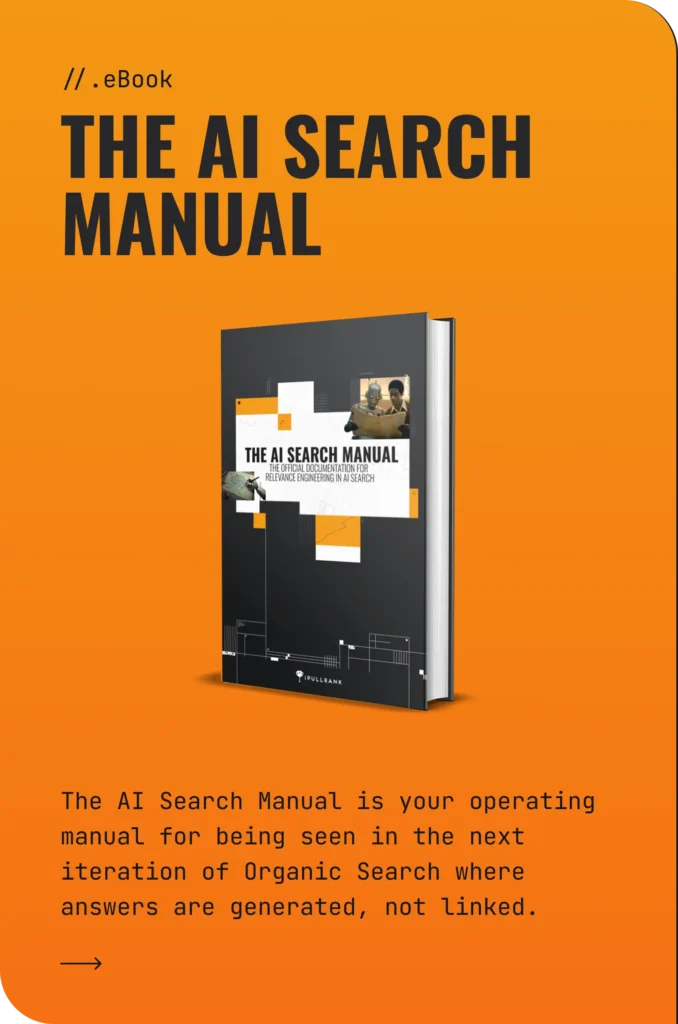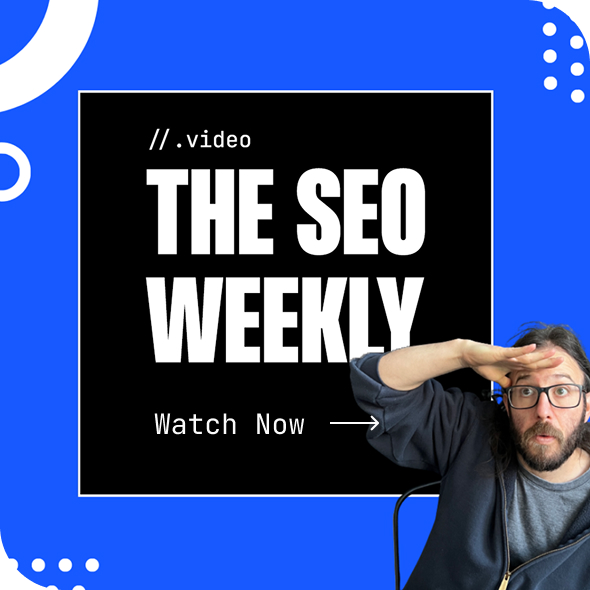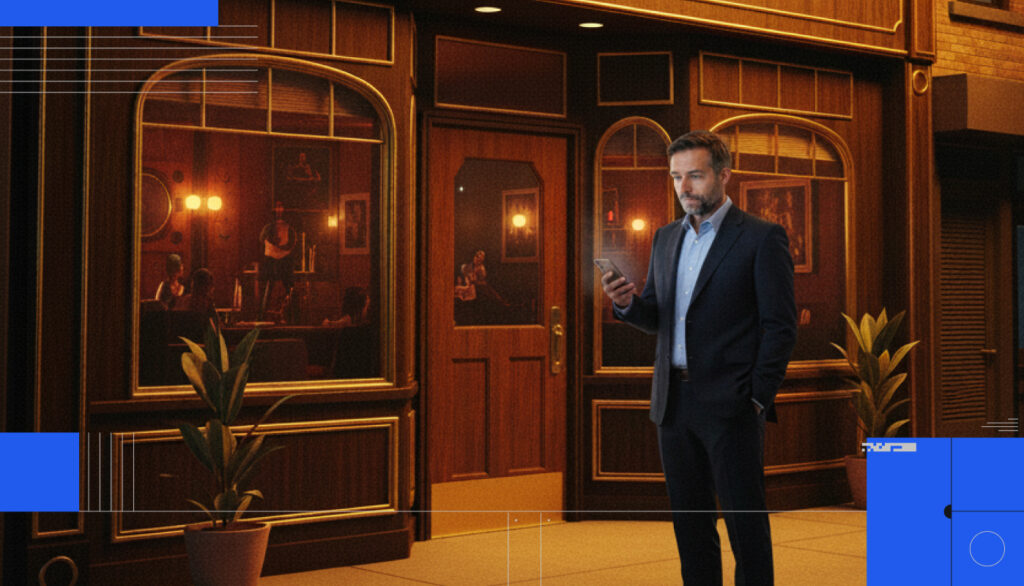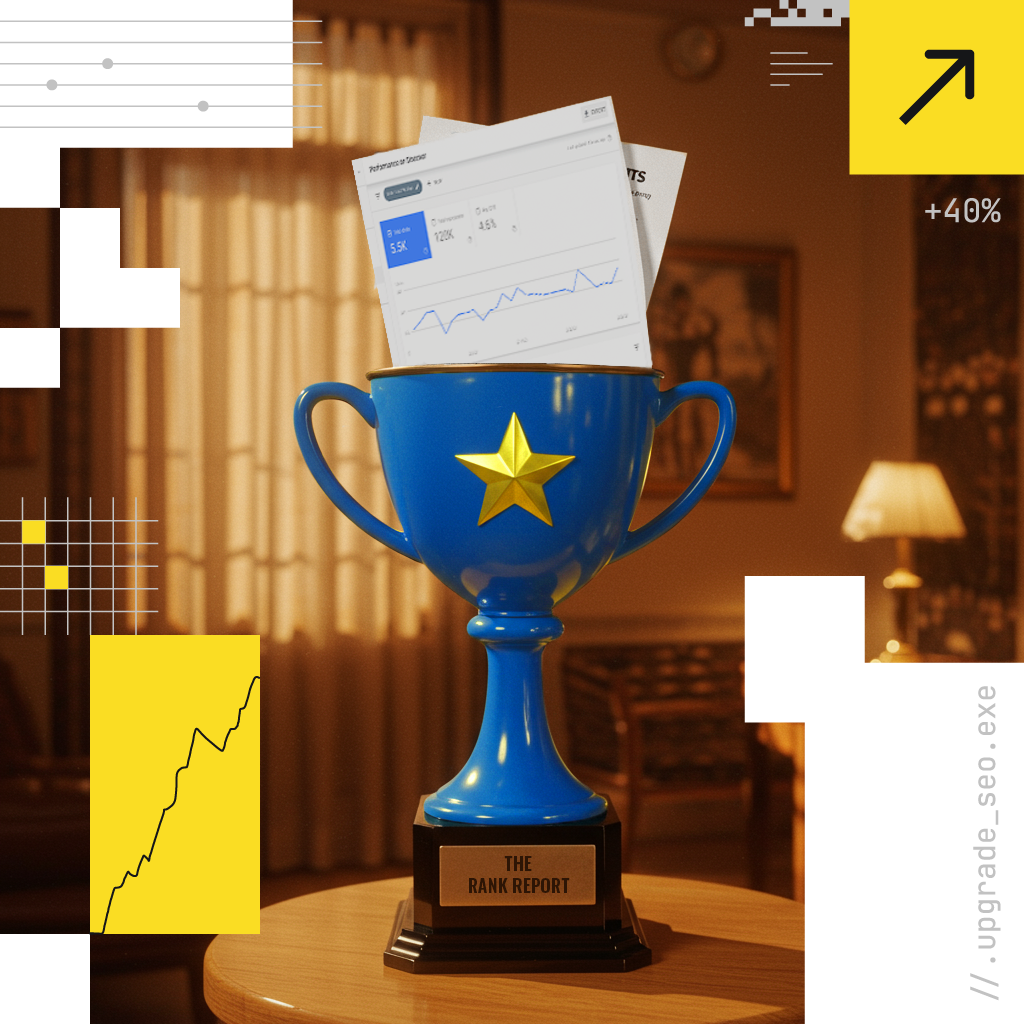TL;DR
- Mountain Dew had the most brand visibility for Super Bowl Ad prompts across conversational platforms at 46%.
- Budweiser was ranked first for Best Super Bowl Commercial prompts.
- Hellmann’s was ranked first for Funniest Super Bowl Commercial prompts.
- Nike was ranked first for most inspiring Super Bowl Commercial prompts.
- Only ChatGPT included its own commercial in the rankings.
- The top cited publications for Super Bowl Ad conversational searches were ABC News (Copilot), Teen Vogue (ChatGPT), Listverse (AI Overviews), and NPR (Perplexity).
- Super Bowl Ad Prompts primarily cited news sites (Fox Sports and ABC News), cultural sites (People and Entertainment Weekly), YouTube, and Wikipedia.
- Citation Volume fluctuated significantly daily, with sites like Sportscasting.com having 1398 citations on 2-3, 135 citations on 2-9, and 13 mentions on 2-10.
Does ChatGPT have a favorite Super Bowl ad?
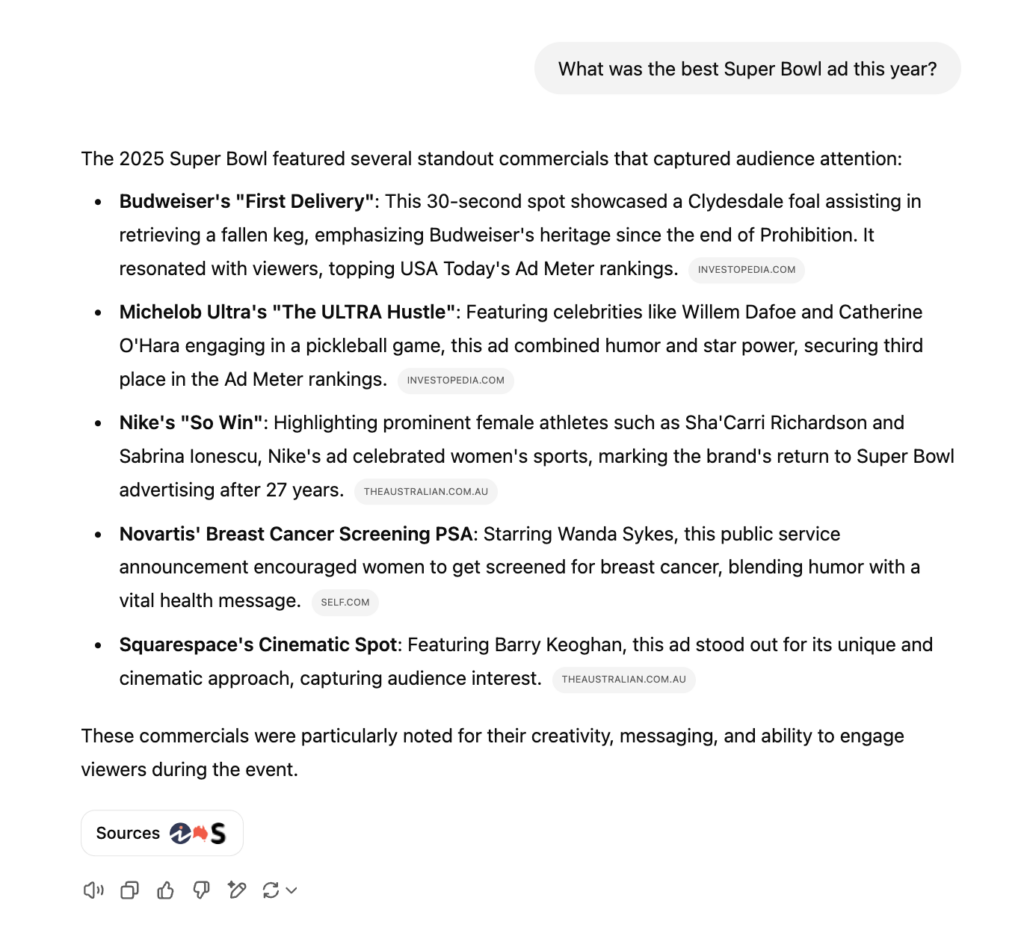
Did you get the same result? No?
Now, try asking about the best 2025 Super Bowl ad.
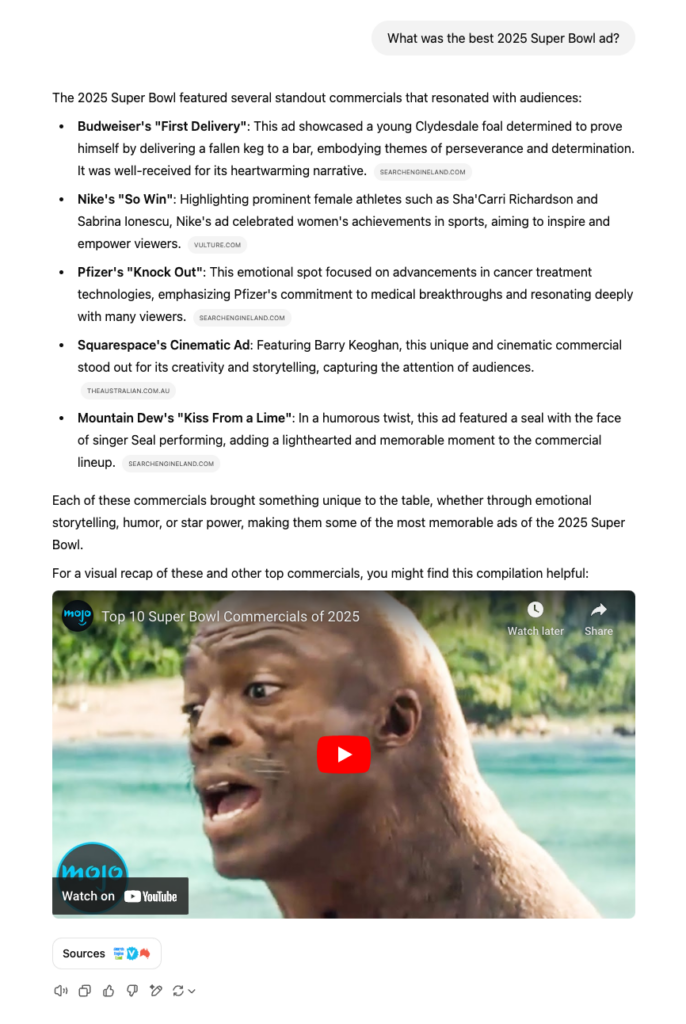
Oh, look, it’s Seal’s face on a Seal. Thanks for the nightmare fuel Mountain Dew. You won the Super Bowl. No. Really.
When the Philadelphia Eagles embarrassed the Kansas City Chiefs, marketers wanted to know which ads resonated with the nation, but who’s paying attention to the conversational search platforms? I am.
The Super Bowl is everything to marketers.
Conversation search platforms will eventually play a larger role in post-event marketing, but currently, real-time relevance has proven to be unpredictable. We don’t have enough data.
If brands release Super Bowl ad teasers or full ads early, could they get picked up by media outlets and influence AI-generated content far in advance? Or should they capitalize on surprise and engagement right after the broadcast?
What does a real-time conversational search look like? As marketers, we’re still trying to monitor and report on visibility in ChatGPT 4o, AI Overviews, Copilot, and Perplexity.
It’s tricky due to the long-tail nature of these searches and the limited performance reporting tools.
But Mike King, founder of CEO of iPullRank, has it right, according to him:
How did Uber Eats and other brands stack up and stand out in the output of conversational search platforms?
Conversational search platforms are becoming brand channels in their own right, shaping how consumers engage with and recall brands.
Mountain Dew didn’t just win on TV—they secured a dominant presence in AI-generated conversations. These platforms aren’t performance channels in the traditional sense; they’re brand storytelling environments where visibility is dictated by how AI surfaces content.
Marketers need to think beyond search rankings and start considering how their brand narratives are being shaped across ChatGPT, AI Overviews, Copilot, and Perplexity. The real opportunity isn’t just in being mentioned—it’s in ensuring your brand’s story is told the right way.
With the Super Bowl over and a record 126 Million American viewers, I thought it would be an excellent opportunity to team up with LLM monitoring software Profound to see how Chatbots have answered questions related to Super Bowl advertising in the 48 hours since the broadcast.
Let’s investigate the visibility, citations, and platform volatility across various topics. Our focus will center on Uber Eats and their viral Super Bowl ad, A Century of Cravings, starring Matthew McConaughey:
How did Uber Eats and other brands stack up and stand out in the output of conversational search platforms?
Super Bowl 2025 Ad Conversational Search Analysis Methodology
With Profound, you select a topic, and they generate a wide variety of queries that someone might search for across that topic. They capture the generative AI answers for the prompts across four different chatbots:
- ChatGPT 4o
- Google AI Overviews
- Microsoft Copilot
- Perplexity
The software ranks the brands listed and examines the citations used for the generated output. A variety of impressive data visualizations allow for compelling insight analysis across a variety of calculated metrics.
For this project, we analyzed the following topics across 4,408 prompts and 19,600 citations from Sunday, February 9th to Monday, February 10th:
- Best Super Bowl Commercials
- Funniest Super Bowl Commercials
- Most Viral Super Bowl Commercials
- Most Creative Super Bowl Commercials
- Most Emotional Super Bowl Commercials
- Most Inspiring Super Bowl Commercials
- Most Controversial Super Bowl Commercials
- And more
Initially, I analyzed various Chatbot performance metrics for individual brands, including brand and topic visibility scores (calculated by brand mentions divided by total AI answers for a given topic).
Here are the results for Uber Eats’ visibility performance across all monitored brands and topics:

Across all of these topics, the top-performing commercials came from:
- Mountain Dew
- Hellmann’s
- Uber Eats
- Dunkin
- Bud Light
Now let’s look at how these brands performed on Google Trends:
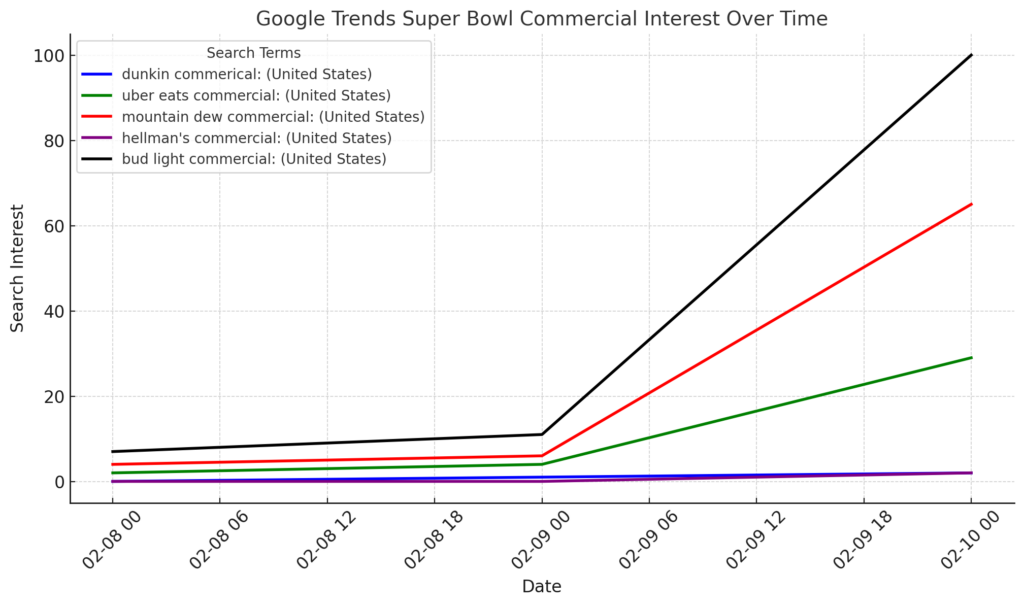
Despite a clear Google Trend search preferences for Bud Light, Mountain Dew earned more visibility in conversational search platforms. Chatbots clearly aren’t influenced by general search trends.
You can see how Uber Eats performed across a range of different categories. Based on Uber Eats’ reliance on humor and celebrities (Greta Gerwig, Charli XCX, Martha Stewart, Sean Evans, and Kevin Bacon all made appearances supporting Matthew McConaughey), it makes sense that it would do better for the topics Most Viral Super Bowl Commercials (59% visibility), Best Celebrity-Featured Superbowls (77% visibility), and Funniest Super Bowl Commercials (42% visibility)
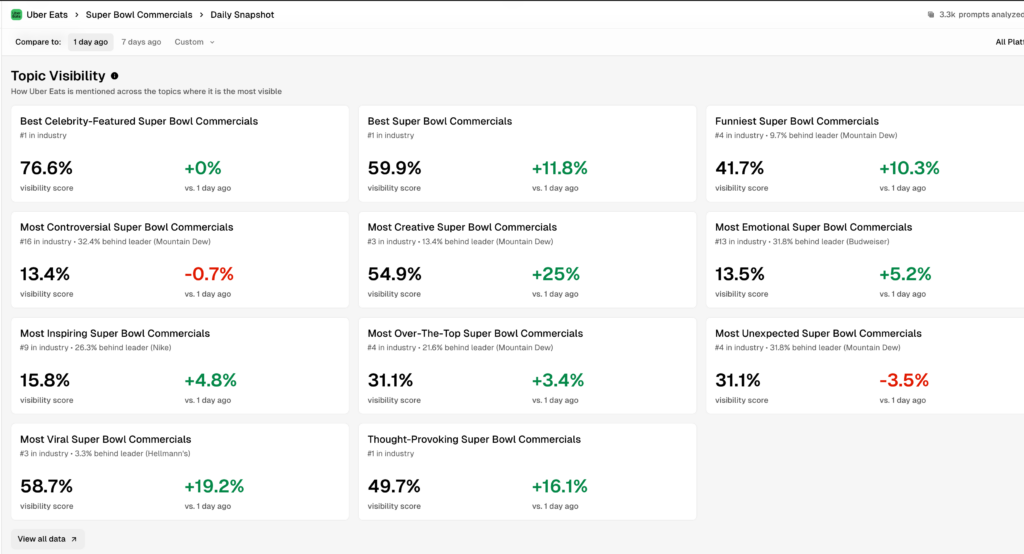
There are stark differences between Chatbot platforms. When you segment between the four LLMs, you see completely different narratives.
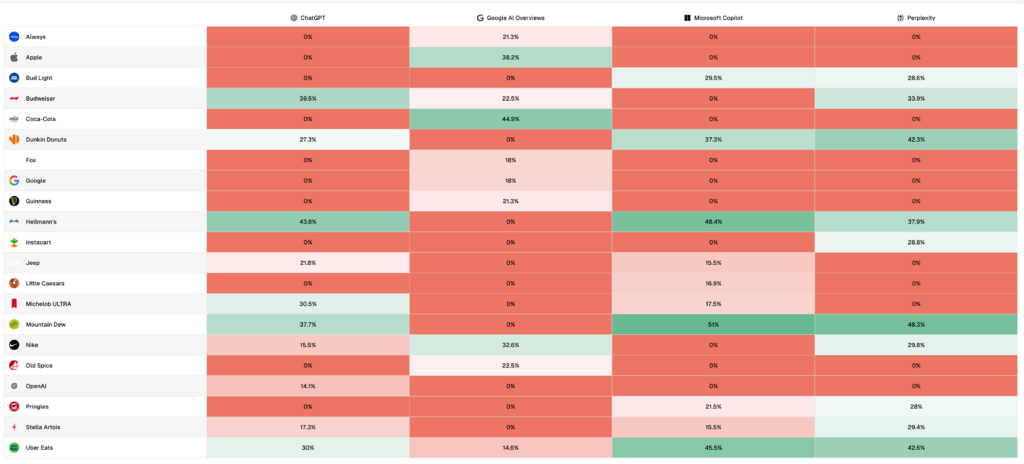
- Coca-Cola dominates on Google AI Overviews with 45% visibility but is absent on ChatGPT, Perplexity, and Copilot.
- Hellmans performs well, with 40-50% visibility for ChatGPT, Perplexity, and Copilot but 0% visibility for AI Overviews.
- Uber Eats performs across all four but has a 20% lower visibility on ChatGPT and AI Overviews than Perplexity and Copilot.
Remember how ChatGPT debuted its own commercial during the Super Bowl? It was a great commercial! Did the other platforms think so? Not really.
Only ChatGPT included its brand in search results for thought-provoking Super Bowl commercial prompts (but not Google).
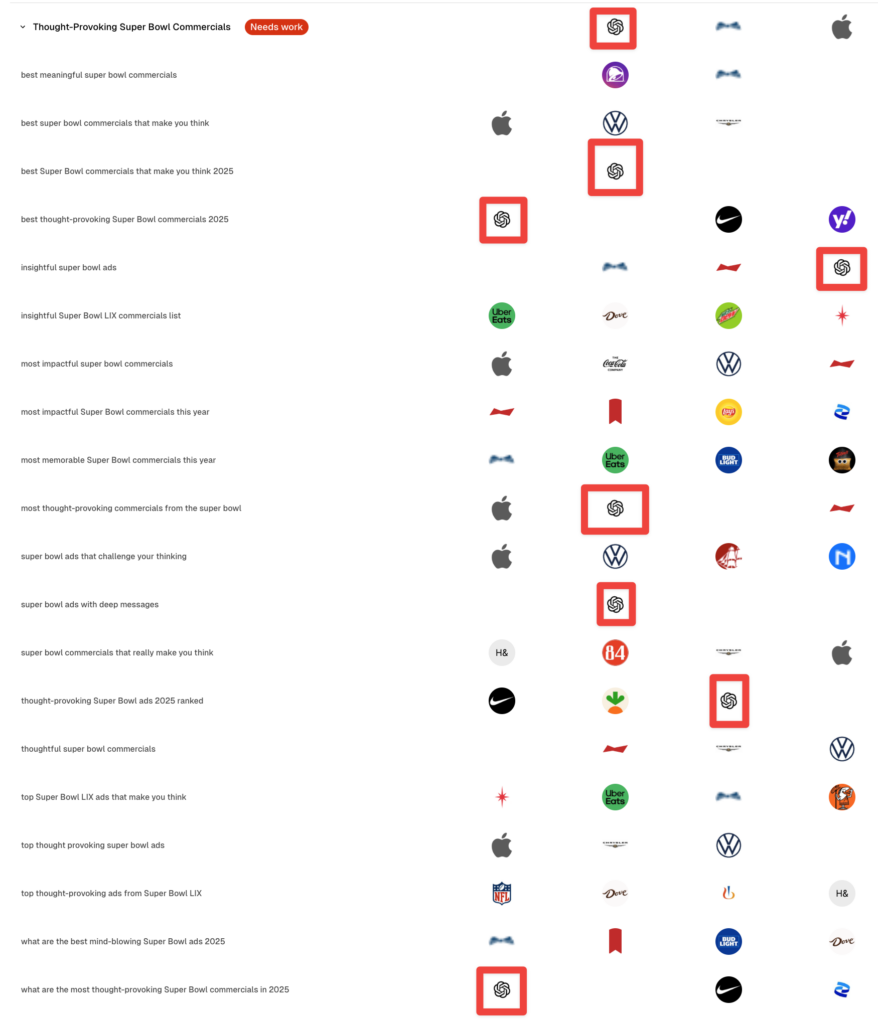
How about AI Overviews? They included Google, but not ChatGPT, and not as egregiously.
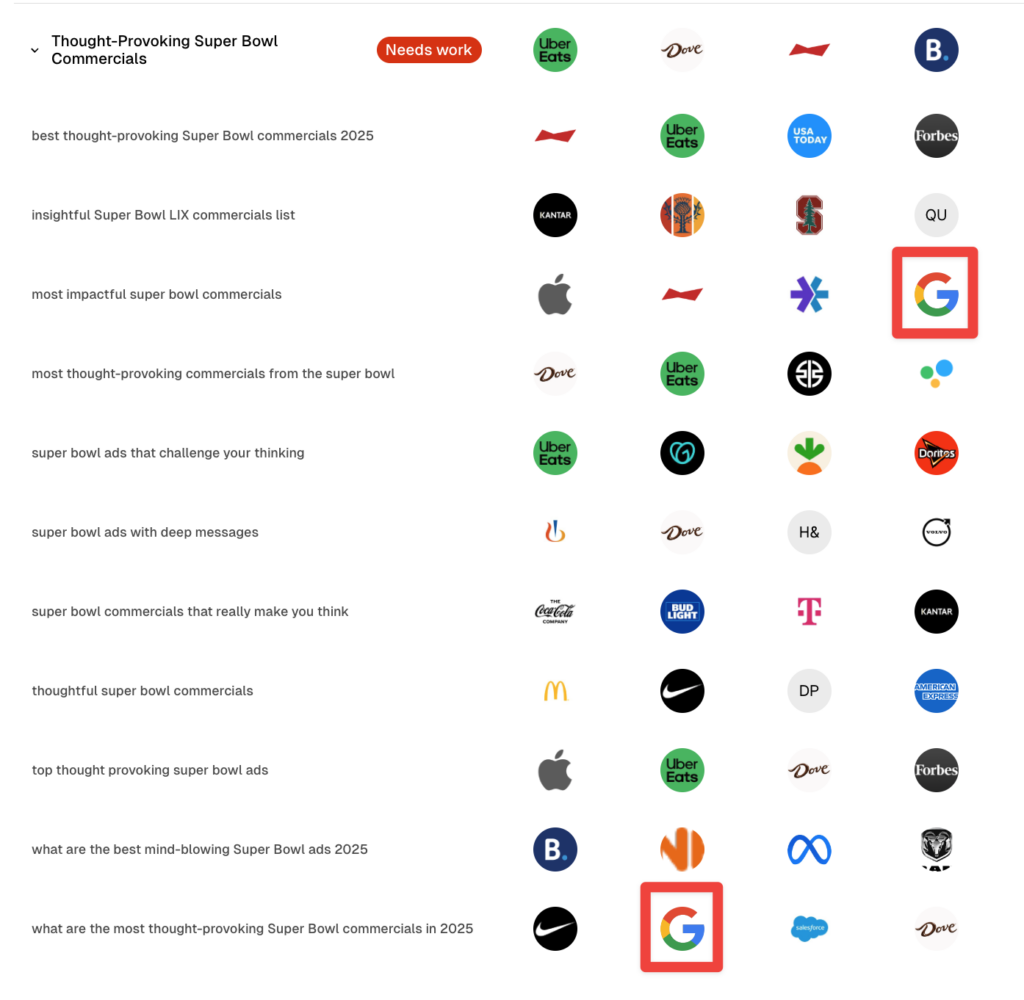
And Perplexity? Surprisingly, no ChatGPT, but more Google than Google.
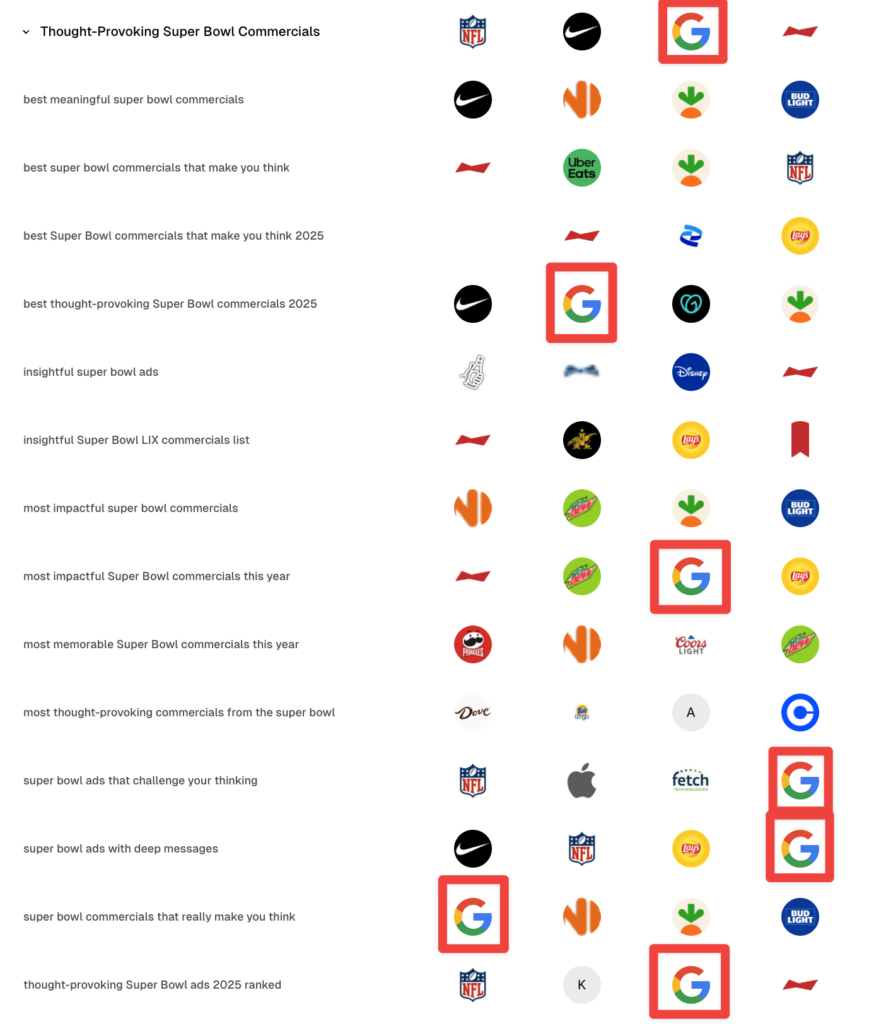
These results highlight another type of bias we need to consider when using conversational search platforms: they’re steering your answers based on their own parameters and training data.
Does this mean that Perplexity is less biased than AI Overviews and ChatGPT? Not necessarily. The conversational search platform bias can show up in different ways.
Google’s AI Overviews have shifted from a lack of authoritative sources to an overreliance on big brands. There have also been fluctuations between the inclusion and exclusion of UGC content like Reddit and LinkedIn.
ChatGPT is a LLM and a search engine second. The same algorithmic guardrails that Google has put in place over the past couple of decades haven’t been prioritized for ChatGPT. We don’t know the extent to which ChatGPT depends on Bing’s index, relevance, and ranking signals versus its own model. It’s something to continue to experiment with and research.
Taking these results into account, you must consider other subtle impacts of search engine bias on the generative outputs.
Topic Specific Conversational Search Platform Performance
Ranked by topics, you can see why Budweiser, Dunkin, and Mountain Dew performed the best according to these charts.
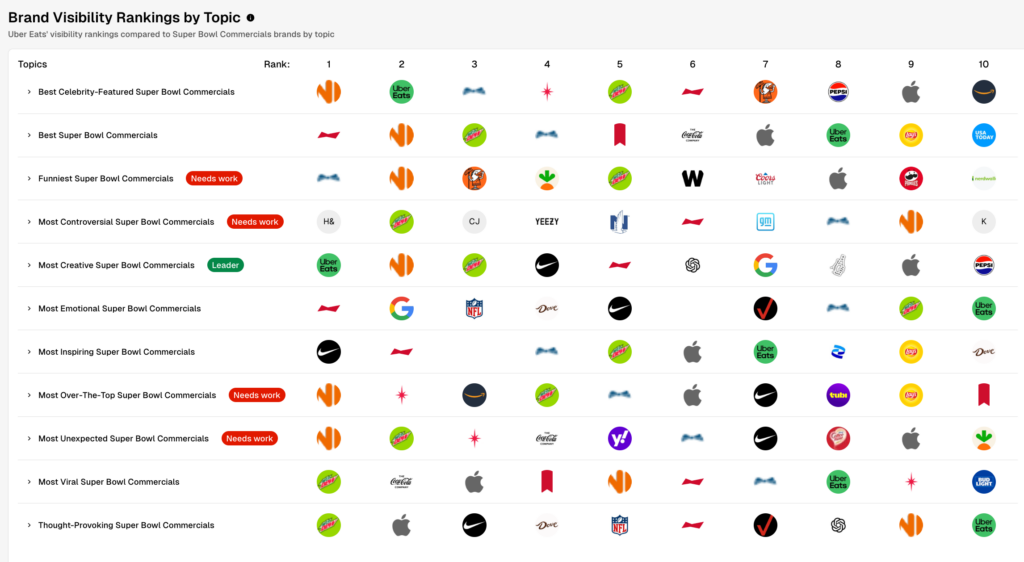
Budweiser ranked first for:
- Best Super Bowl Commercial
- Most Emotional Super Bowl Commercial
Dunkin ranked first for:
- Best Celebrity Featured Super Bowl Commercial
- Most Over the Top Super Bowl Commercial
- Most Unexpected Super Bowl Commercial
Mountain Dew ranked first for:
- Most Viral Super Bowl Commercial
- Thought-Provoking Super Bowl Commercial
What Citations Feed the Conversational Search Output?
How are these rankings being determined? With the time-sensitive nature of the Super Bowl, we can infer the impact of the articles being written about them would significantly impact the output. But the marketing of Super Bowl commercials has changed over the years with brands releasing their Super Bowl ads as early as a week before the big game. This provides media outlets with more time to spin up articles about what we can expect to see.
Does that impact the brands that are listed for our topics?
Here’s the citation universe for all of the generated outputs across our 4,408 prompts, with 19,600:
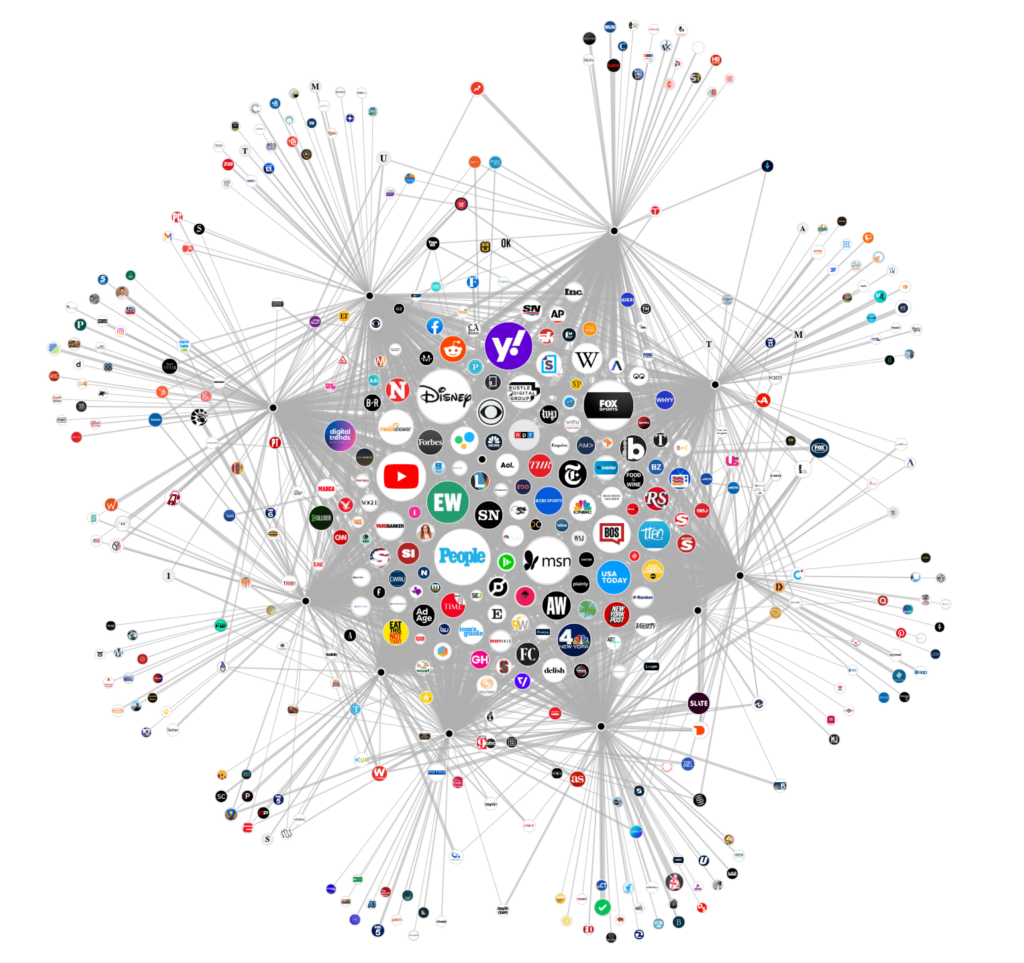
Of the 4,408 prompts sent, only 60% included citations.

Of the 19K citations, here are the top domains that were cited in the output across all platforms:

Note: In this case, Go.com represents articles on abcnews.go.com.
You can see an interesting variety of domains that were used in generating the output.
Digital Culture Media:
- People
- Entertainment Weekly
News Media:
- ABC News
- Fox Sports
- Boston News
- Yahoo
- NBC New York
We also saw that YouTube had a large contribution as the 4th most cited domain. Digging deeper into the data, the reason for the high ranking is due to a significant reliance on the site by Perplexity (while not being used for any of the other three platforms). Here is the citation variability across platforms:
Perplexity:

ChatGPT 4o:

AI Overviews:

Copilot:

As we look across the different platforms, there’s a surprising lack of overlap. These charts show the domain visibility, but what about individual articles?
Here are the most cited links across the four platforms for all of our topics:
ChatGPT 4o:
- Teen Vogue (Same article on Sunday and Monday)
- 25 Best Super Bowl Commercials of 2025 – Watch Them All
- Published 2/10/2025
- 79 mentions
AI Overviews:
- Listverse (When I specifically went to Sunday’s results – it was another pre-Super Bowl article. This one from Fox Sports)
- The 10 Most Memorable Commercials of All Time
- Published: 1/13/2025
- 58 mentions
Perplexity:
- NPR (Same article on Sunday and Monday)
- The Best (and Worst) Super Bowl Commercials this Year
- Updated: 2/10/2025 3:29 pm
- 245 mentions
Copilot:
- ABC News (Fox Sports article on Sunday)
- Super Bowl 2025: A Roundup of the Best Commercials of the Game
- Published: 2/9/2025 9:28 pm
- 1049 mentions
Notice the difference between freshness of articles? After analyzing the self-reported publish date, we can see the distribution of content freshness used in citations across platforms.
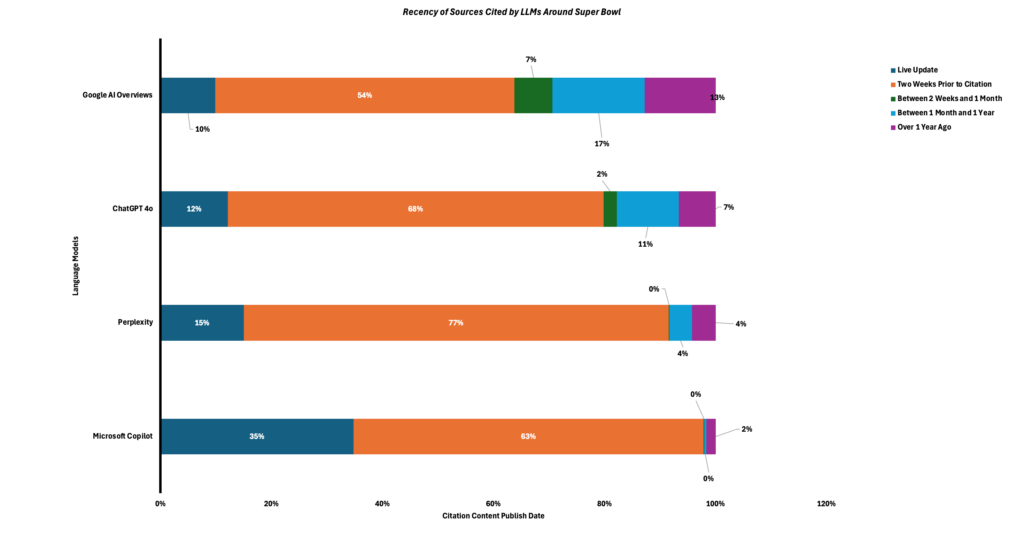
Google’s AI Overviews are skewed toward evergreen listicles and older published content, which may not reflect real-time trends. This seems surprising, considering that AI Overviews typically include more fresh content in their output. In this analysis, Copilot and Perplexity cite more recently published or updated content.
We must consider the dual nature of conversational search—balancing recency with authoritative sources to maintain visibility, but expect Google to eventually get better at that.
We also saw fewer prompts that had AI Overviews which indicates that for real-time events, Google is still hesitant to deploy AI Overviews for these time sensitive queries. I’d hypothesize that it’s due to an editorial responsibility not to undermine the trust in the brand, but ironically, the citing of content from over a year ago does just that.
A few interesting takeaways from this data:
- These conversational search platforms don’t just reflect brand visibility; they influence search behavior by steering users to specific narratives.
- When Perplexity heavily cited YouTube, for example, users were guided toward video content over traditional articles.
- Based on the lack of a text snippet sourced by Perplexity, we can conclude that the platform is transcribing videos like Google.

And as we dive into the source of YouTube citations, three of the top five come from one change. Mediocre Films.
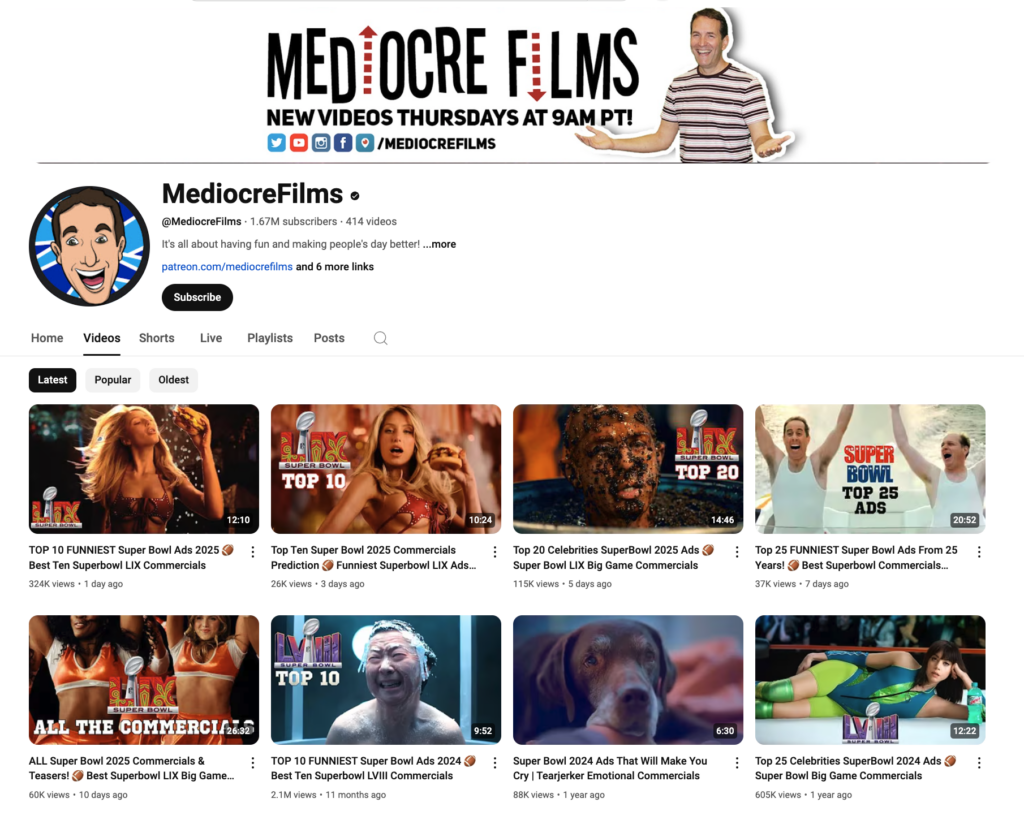
With 1.67M subscribers and lacking video topic diversity, conversational search platforms are overindexing this channel’s content.
Despite Google’s overreliance on the user-generated forum, we’re also not seeing Reddit citations as the most sourced content. Also, exact match domains still benefit from relevance, as demonstrated by superbowl-ads.com.
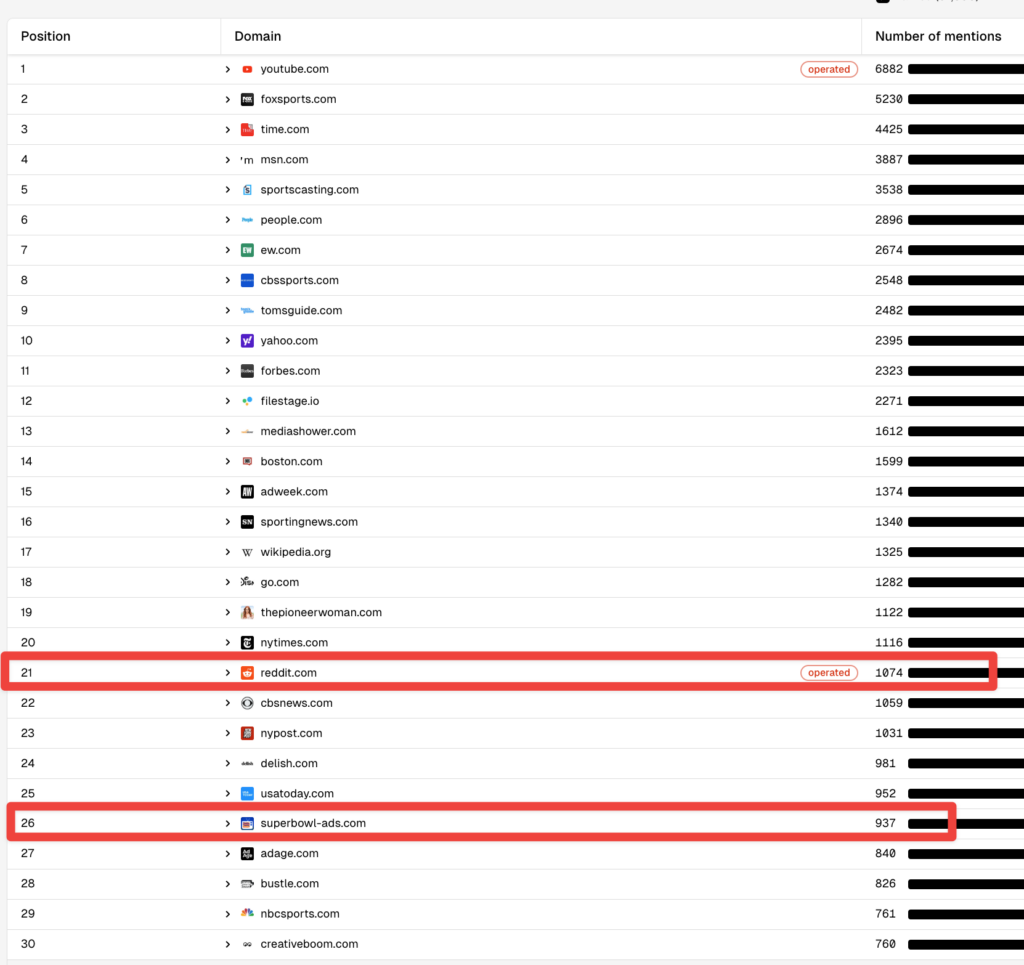
Currently, none of the platforms cited brand websites in their outputs. YouTube was the only channel that a brand might have a direct impact on (and that was explicitly for Perplexity). These results highlight the importance of media publishers for events and the growing value of digital PR in conversational search platform visibility. Strategically embedding Super Bowl-related content into partnerships and press releases timed around major events could boost citation rates, but leveraging the media is your best direction.
Finally, we can analyze the sentiment analysis of the output. They say that any publicity is good publicity. That’s not always true when it comes to reputation. No brand wants a lukewarm or negative reaction to their Super Bowl ad.
How did the top performers stand up?
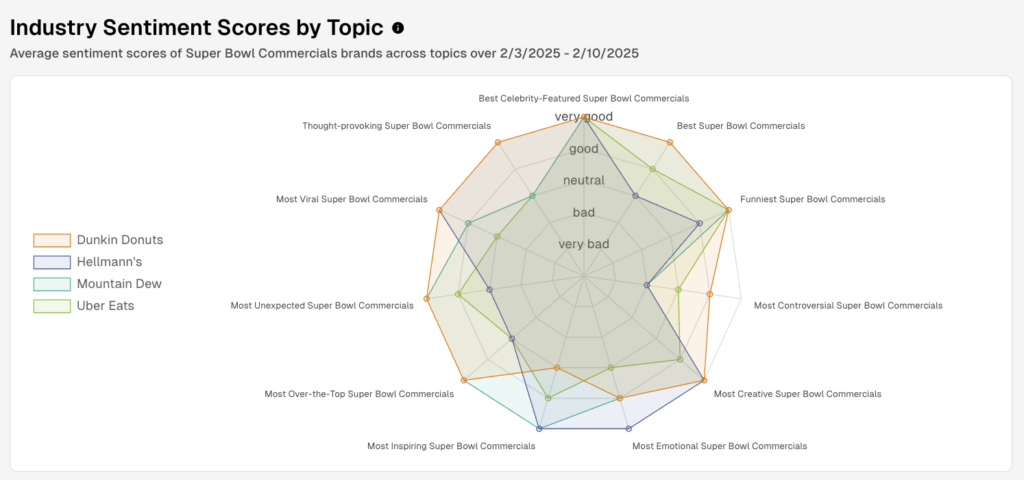
No brands tarnished their reputation, but Dunkin clearly stood out across all of our Super Bowl commercial prompts.
How Dynamic Are These Results?
With SEO, we’re used to being able to entrench some of our evergreen content at the top of the SERPs over a longer period of time. But conversational search (especially for fresh events) is incredibly volatile. With prompts that include citations, the Retrieval Augmented Generation output (that pulls content from Google or Bing indexes) changes dramatically from day to day.
The fluctuation in citation volume by day for the top nine domains across all our platforms is steep.
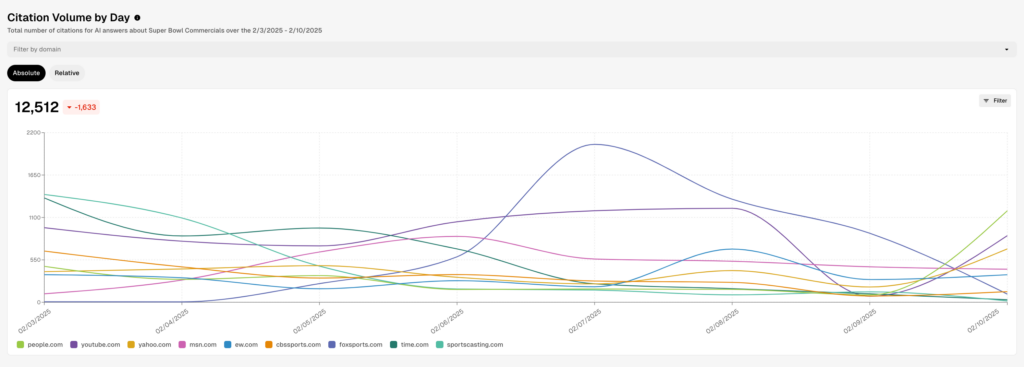
As a result, the brand rankings changed as we approached the Super Bowl.
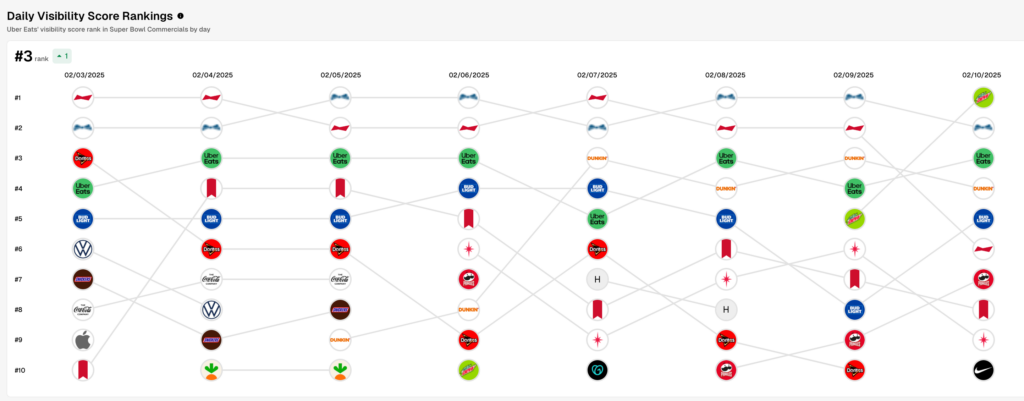
The most significant differences in brand visibility occurred from 2/7 to 2/8 and from 2/9 to 2/10. As we approached the Super Bowl, many speculative and preview articles covered advertising expectations. The brands’ rankings were adjusted accordingly.
But as you zoom out even further, you can see the sheer volatility of brand rankings over time.

Leading up to the Super Bowl, Hellmann’s flip flopped rankings until Mountain Dew usurped both of them. You can clearly see the virality of the commercial had an impact briefly appearing on February 6th before vaulting to the top of the visibility rankings on the day of the Super Bowl.
It suggests that the appeal of the Seal commercial generated the most high authority press, which impacted the brand mentions across platforms.
So what should marketers do with their conversational search strategy?
The first step to experimenting and influencing your visibility in conversational search platforms starts with measurement. The 2025 Super Bowl ads provided a valuable case study of how brands can gain and lose visibility within these environments. The key takeaways are clear.
Early Engagement Matters
Brands that released ads early had a distinct advantage in shaping AI responses by ensuring articles and other content were already indexed and referenced across platforms. For other cultural moments—such as major holidays, awards shows, or product launches—marketers should coordinate with publishers ahead of time to ensure timely coverage. This operates similarly to existing SEO practices. There’s a balance between relevance and freshness. Freshness tends to take precedence, but it’s not always immediate.
Platform-Specific Optimization
Visibility varies significantly across platforms. For example, Coca-Cola performed well on Google AI Overviews but was absent on other chatbots. Understanding and investigating these differences can help marketers tailor strategies to maximize presence. Some platforms may favor highly authoritative, evergreen content, while others lean on video or culturally relevant media like People or Entertainment Weekly. ChatGPT focuses on pure relevance and doesn’t always incorporate the E-E-A-T signals we expect from a search engine like Google.
Focus on Authoritative Partnerships
The absence of brand websites in citations highlights the need for strong third-party validation. Brands can increase their chances of being cited in generative AI responses by collaborating with respected media outlets or influencers. Press kits aimed at platforms frequently cited by LLMs should accompany news events, product updates, or viral campaigns.
Real-Time Event Monitoring
Super Bowl ads were tracked over a 48-hour window, demonstrating how dynamic these platforms can be. For marketers handling real-time events like breaking news or viral moments, it’s critical to have tools like Profound or similar LLM monitoring software. By analyzing prompt performance, citation trends, and platform volatility, marketers can make data-driven adjustments to content and engagement strategies in near real time.
Many of these data points reflect what SEOs currently do when breaking news happens. That said, conversational search platforms don’t always leverage the most respected or relevant publications. That will likely change, but there’s an element of unpredictability since these platforms try to satisfy the searcher and provide results that reflect what they want. ChatGPT won’t try to steer you away from how you phrase your search.
Diversify Content Types
Since platforms like Perplexity might emphasize video citations (e.g., YouTube), brands should diversify their content assets to cover multiple formats. This could include blog posts, news features, listicles, and interactive experiences designed to attract and retain conversational search platform citations. You saw at the beginning of this article that a YouTube video was included in the ChatGPT output. What happens when searchers expect to see a TikTok video when they use Google’s Project Astra or Circle to Search to get insights into the visual world around them?
We need to feed images of our brand into our content. We need to be cognizant of how our OOH advertising and sponsorships show up in the wild. Does your product packaging match retailer shelves? As the digital world becomes multimodal inputs (video, audio, textual), marketers must ensure that our content matches the best medium for a specific search type.
- A search about “how to change a tire” will require video or imagery content.
- A search about fashion brands will require seeing what clothes might look like on the searcher.
- A search for K-Pop will best be served by audio samples.
Match the content type to the search.
How will Search Behavior Change?
We need to understand what content is being generated for conversational searches. The challenge for marketers is that:
- These environments don’t provide their own reporting.
- We don’t have reliable search volume data for conversation search platforms.
- We don’t know the extent to which these platforms (ChatGPT) are incorporating traditional search ranking factors and signals into the output.
- The generations are dynamic and volatile; we’ll rarely see the exact same output twice.
- It’s unclear when (and if) these platforms will ultimately replace traditional search channels.
- We don’t know how people are searching using these tools and the psychology behind their searches.
We already know that Google is evolving search results. They continuously test ‘AI modes’ of AI overviews and AI-organized search results. While Google’s search engine market share has only recently dipped below 90%, it’s likely that over time, searchers will add tools like Perplexity and ChatGPT as their primary search options.
We need to pay attention to these channels, do our best to monitor performance (despite the ambiguities it poses), and evolve our own organic search strategy to ensure visibility for our core topics on these conversational search platforms.
